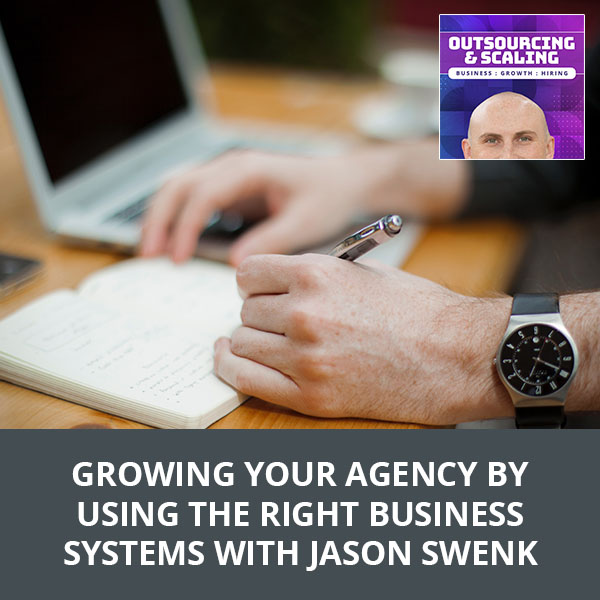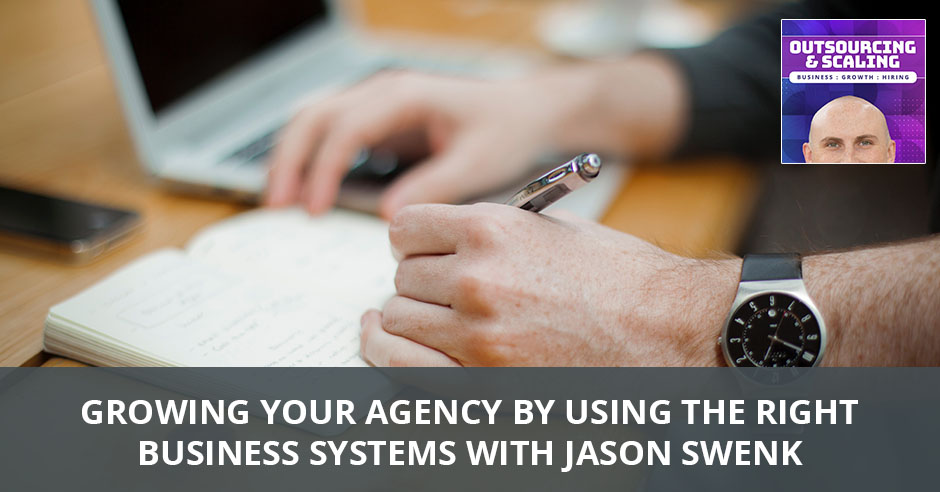


—
Listen to the podcast here:
[smart_track_player url=”https://www.podetize.com/statsapi/www.podetize.com/wp-content/uploads/fileuploads/11-5b145ef137b51b3d1af0633e9305c43d/05/2019/be392ed3d2a0dbb6ce19a49551b5610d.mp3″ title=”Growing Your Agency By Using The Right Business Systems with Jason Swenk” artist=”Nathan Hirsch” image=”https://freeup.net/wp-content/uploads/2019/04/OAS.png” ]
Download the audio file here.
Growing Your Agency By Using The Right Business Systems with Jason Swenk
We have a special guest, Jason Swenk. Jason, how are you doing?
I’m doing good, Nate.
Jason is an expert at building agencies. He has a great Facebook group, Digital Agency Insiders. Why don’t you give us a little backstory? How did you get into growing your first agency? Why did you create the group? Give us a little bit more.
Like most people, I fell into it by accident. Around 1998, one of my friends looked like Justin Timberlake. I created a fake band and fake website making fun of NSYNC. It had me and my one friend that looked like Justin and two others, and it got wildly popular and then people started asking me to design websites. I started designing $500 websites and eventually started selling million-dollar websites much later on. I was working with brands like Hitachi, LegalZoom, AT&T, Lotus Cars. We grew it up to a big agency and were able to exit and then I didn’t know what I wanted to do afterwards. After the first week, I was depressed. I created an iPhone app called The Grass Is Greener On That Side and then I was lucky enough that old competitors in the agency were like, “How did you scale? How did you sell? How did you do X?” I was good at it and I started helping them out for free and my wife said, why don’t you do that as your next business? What I’m doing now is to create a resource I wish I had when I was growing my agency to help people grow their agency a little bit faster, show them the systems and strategies that are working and just connect them with amazing people.
Let’s say you have an agency owner, they’d gotten off the ground, they’d gotten first few clients and you want to help them. How do you go about seeing where they’re at or what they need to do to take that next step?
It all starts with looking at the foundation that they have. Remember, my story was accidental. If I go back and looked at the first couple of years, we were reactionary and we didn’t have that clarity of where we wanted to go. We didn’t know who we are going after. By not knowing that kind of stuff, we didn’t know what to say no to. We didn’t know how to position ourselves. We didn’t know what we should be offering, what we should actually be charging. A lot of times when I start looking at agencies that are struggling, you have to go back to the foundational systems. I grew up playing tennis. I played in college and I was one of the best in the country. I remember a lot of times my coach would say, “You’ve got to go back to the basics. Remember to take the racket back, focus on the ball and hit through, stop overthinking it.” That’s what a lot of agencies are doing. They’re overthinking it. They don’t have the right foundation to build on.
What about going after everyone? You hear a lot about niching down. Do you have a certain mindset when it comes to that? When you’re young, should you take on every single client? Should you get very specific and reject people? Is there a fine line there?
It depends on where you are at in the agency. If you’re starting out, it’s like going to a Vegas buffet. If this is your first time at a Vegas buffet, it is overwhelming. They have twenty tables of every single food thing you can only imagine. I would tell you to try out little bits of everything to see what you don’t like. Through the process of elimination and figuring out what you’re good at, you can start to figure out what is your niche going forward. You’ve got to know the end goal, “I need to specialize so I can start eliminating my competition.” You’ve already been doing it. You should do a process of elimination of starting with, “What’s the thing I don’t like anymore?” Then just getting rid of that. It’s not an instant thing and there’s no course out there or a silver bullet from anybody out there that says, “These are the most profitable niches.” Everyone is different and you’re different. You just have to look for the signs and treat it like a Vegas buffet, try everything and then start getting rid of stuff.
Are you more on the technical side or are you more on the creative side or somewhere in between?
I was a Unicorn. My first job was with Arthur Andersen as a computer programmer. My degree was in computer programming, but here’s the deal. I hate programming. In college, I outsourced all my work. If I ever go back to speak at my college or my university, I would be like, “I learned how to outsource. That’s all I learned: communication and outsourcing.” I was always an artist and I was a cartoonist. I’m on the design side as well but I can look at a piece of code, I can write code but my passion is more into the creative.

You’re on the FreeUp YouTube channel and you mentioned outsourcing. Any advice for people that want to outsource or hire remotely as they’re growing their agency?
A good exercise I always tell people to do is if you get an 8.5×11 piece of paper and you put your fist on this piece of paper and draw a circle around it. Everything within it should say, “Do.” Everything outside should be don’t. The circle is about 80% smaller than the rest of the piece of paper. Everything on the outside you should try to figure out, “Should I say no to it? Should I outsource it?” Everything in the middle is what you should be focusing on that no one else can do. If you’re good at strategy, you’re good at sales, but you suck at project management or doing thumbnails or whatever, outsource that to someone else. It’s different for everybody going through it, but you have to be self-aware.
I do the same thing. I say identify your strengths, identify your weaknesses and figure out how to turn those weaknesses into strengths. If you’re not a Unicorn and you’re more on the tactical side, you could spend months and months trying to take courses and make yourself a creative person but is that a good use of your time when you can hire someone and quickly turn that weakness into a strength? It then comes down to making the right hire. You’ve obviously hired a lot of people. I’m assuming you’ve made some hiring mistakes along the way as well. What have you learned from those? What do you look for in people that you hire?
It goes back to clarity. The first system that I talked about, you have to have the vision of where you’re going. If you’re an accidental agency owner, you have no clue. You’ll be reacting to what’s coming to you. It’s like you get on a boat from the US going over to London but you don’t tell anybody on your team where the boat’s going. When you get tired after about ten hours, you go downstairs and then the boat keeps turning direction obviously because of the seas and the tides and that kind of stuff. Every minute, your team actually comes down, physically asks you, “The boat changed direction, can you go fix it?” You have to go up and you do this about a hundred times and you’re like, “Why don’t I just tell them where I’m going? Then I can sleep.” That’s the same thing with your company. The other thing too is once you know where you’re going, you have to figure out what are your internal core values. Not your company core values but you have to start with your own. My core value is, “Always do more with less.” Be creative, celebrate wins, celebrate failures, be resourceful. Those are our internal core values that spread to the company.
When I’m about to hire someone, they have to have those. I’m asking questions. I’m not saying, “Are you creative? Do you do more with less?” They’re always going to say yes. I’m asking questions in order to determine that. Then another thing that we would do is we’d always delegate the outcomes we want rather than delegate tasks. When you delegate tasks, people are going to do it exactly that way but remember, it goes back to our core values. We want people to be resourceful. I’m not the fastest, I’m not the best at everything. I’m not the best at anything. That’s what my wife says and my kids say. I’ll just say, “This is what I want. Go figure it out. If you can make it faster, great, even better.”
Outsourcing tasks is ideal if you don’t have the right skillset.
You mentioned sales in there and I think sales is probably one of the toughest things to hire for but at the basis of running an agency, if you can’t sell, nothing else matters. Do you agree that off the ground, you have to be the one selling? Do you have to figure out how to become a good salesperson in year one to two and then maybe once you get a budget then hire the next person? Can you get away with building an agency and not have that sales skillset?
I didn’t have that skillset when we started out. I didn’t know what an invoice was. I didn’t know what objections were but I was going through the phone book. I literally would be like, “You don’t have a website. Do you want one?” “What’s a website?” “It’s a thing on the internet where it has your picture and the phone number where people can contact you.” “I’ll take one.” I knew nothing about it. I’m more personable than some people may be. If you’re not a salesperson, find someone to do it for you. It all comes back to self-awareness. If you’re good at execution and managing the team and doing the work, that’s what you should be doing. Then go find a salesperson and get people to help you with the sales part. Most people get into it because they’re a natural salesperson or they’re not selling. I don’t even like to look at it as selling. I’m just saying, “This is your problem. I can help you do this.” That’s my selling thing versus like, “What will it cost you if you don’t do this and doing all that crap? This car is awesome.”
Do you have any sales tricks or tips or anything that you’ve picked up over the years? I know you said that you’re not doing the hard sales, but at the same time there are certain things that you’ve probably seen that work or don’t work.
What I would always train my sales team on is remembering NBAT. It stands for what’s the Need. Does the need of the prospect actually match up with what we can actually deliver? If it doesn’t, walk away. Pass it off to someone else. Don’t take on work that you’re going to screw up because then they’re never going to come back to you and they’re going to bash you saying, “Those guys are idiots.” You’ve got to make sure it matches with that need. The next is the budget. When I’m going through NBAT, I’m going through this sucker within the first five minutes, I’m not waiting to the end. We’ve all done a prospect call and then done a proposal, waited months, sometimes even longer and then find out they don’t have a budget or they don’t match up on some of the NBAT that I’m about to tell you.
Whenever I’m doing a keynote, I’ll always ask the room, “How many people ask for a budget?” 50% of the hands go up. “Out of the 50% that asked for the budget, how many people get it?” Half the hands go down. Literally, 75% of the people are pitching services to people that don’t even know their budget. I could get a budget from anybody at about 99% of the time. I would say, “What’s your budget?” The prospect going to say, “I don’t have one. You tell me.” “I love working with people that don’t have a budget so we don’t have to worry about money. We can spend all this stuff testing.” Then I chuckle a little bit. You don’t have to do this every time on this. It has to fit your personality.

The next part I go into and you could do this part every time, “Just so I know if you’re the right prospect for us and if we can actually help you out, I need to know some kind of range.” Most people start low and go high. The human being is always going to remember the first couple things and then they’re going to forget the next. I always do the reverse auctioneer. Are you trying to stay around $1 million, $800,000, $700,000? What range are you trying to stay around? You can always get the budget that way. Once you know the budget, then you’ve got to make sure you’re talking to the right decision maker.
Don’t assume that their title, unless they’re owner/CEO if they’re chief something. They could be Chief of Pencils and you’d be like, “They can make decisions.” You always want to ask, “Based on what you told me you need, how does this match up with your overall company objectives?” They’d be like, “I have no clue.” That is a telltale sign that they’re not the decision maker. “Who knows?” “Nate knows.” “Who’s Nate?” “He’s the CEO.” “Can we get him on the phone?” It’s a nice way to pass them on. Then the T is for timing. You always want to make sure they don’t have unrealistic expectations based on time. Everybody always calls, “I want this yesterday.” “You’re not going to get this tomorrow. If this is a heavy development project or this is a heavy strategy or creative or marketing, whatever it is, it’s going to take a couple of months. Is that okay?” “No, it needs to be done in two days.” “We’re not the best fit for you. See you. Go to this person that I hate.” Those are the first initial tips, just remember NBAT: Need, Budget, Authority and Timing.
What about billing? I’m assuming you want people on monthly retainers, more ongoing work. Is there a certain invoicing style paying up front, 50% upfront? What kind of structure do you like to tell people to set up?
It always depends. I always build in advance when we got smart. If it’s a retainer, I’m always billing ahead of time. If they don’t pay, they don’t get any work. I don’t have to chase them down. If you’re in a project, what we would do is we would change this up a little bit so we could increase cashflow. Let’s say you get $100,000 project and you get 50% upfront but the client keeps dragging their heels. I’ve never seen a client get me stuff I need on time, which always delays the project, which always delays when I’m getting paid. That $100,000 project that I billed for, I’m not going to collect for a very long time, which pisses me off. We would always do 50% upfront halfway through the project or at a certain date the next quarter and then the same thing at the very end, a quarter at the end or at a certain date whichever comes first. Here’s the deal. Most of my clients would always drag their feet but I’m getting paid. I would get paid 100% for the project before being 60% done. The funny thing was I sold the agency in 2012. I started working with this one client in 2004 doing a website. It’s a $100,000 website, but he never got me the stuff I needed. He contacted me in 2014 saying, “I finally got everything ready.” I was like, “I sold the company, that company sold and then so on. Go after these people.”
Can you give us a little glimpse into selling a business? I know it’s something I’ve never done. Probably a lot of the viewers haven’t done that either. Without giving us too much, what’s it like being in that negotiating process, finding a buyer and all that stuff? I’m assuming there are some stressful parts and some relief at the end as well.
Always treat the negotiation process as something that will not happen.
It’s overwhelming. It’s also humbling too. Someone actually wants to buy your baby that you’ve built and grown over time and it’s exciting. If you ever get a chance to go through it, always assume it’s not going to happen. A lot of people that I mentor going through this process, they’ll get excited and they keep trying to take their foot off the gas and I’m like, “Until you have the money in your account and it’s signed, it could fail.” A lot of times when you’re going through this process, it’s a three, six, sometimes a year-long process. If you assume and start counting all your chickens before they hatch and it doesn’t go through, you’re leaving your company in a very vulnerable state where most of the time if the deal doesn’t happen, your business goes under and then it puts a lot of pressure on you and it’s stressful.
I always tell people as you’re going through this process, always treat it as, “This isn’t going to happen.” You’re not going to be able to buy your own mountain or island or whatever it is. Assume you still have to make payroll and all that good stuff. I got depressed after I sold. I benefited greatly, but then all the significance I had for all the employees, the clients, all the work that constantly needed me, I didn’t have that anymore until I found what I’m doing now. Think about that. Most times, it’s harder to sell an agency. In order to get a good value for your agency, you’ve got to get over the eight-figure mark. If you’re under the $2 million mark, someone will buy you but you’re not going to get that much. You’re going to have to work maybe a year or two years after. It’s not going to be a ton of money. People think, “I get $1 million.” A million dollar doesn’t go that far anymore unless you live in the Philippines.
With family and taxes, that gets used up fast.
It gets used up fast. If you can get in the $25 million mark, then it’s a life-changing thing and then you don’t have to make decisions on money necessarily anymore. Always assume it’s not going to happen.
Was there a transition period or you just sell it, sign it, gone or did you help move the clients over? Did they ask you to stay on for a certain period of time?

I had a two-year engagement with them. They brought me over as a key executive. I had to stay with them. I had a noncompete. I was fully going to create another agency but I just had to wait for my noncompete. Then I was just lucky enough about a year and a half after I figured this out, I’m like, “I like this a lot better.” There was a great need. Most of the people in my space now, they never had that experience. They just had a year in an agency and they’re like, “I can offer advice.” I’m like, “I’m sure you can offer advice, but it might not be the right one.” I found a lot of significance and reward from this choice.
I appreciate you coming on. If people want to learn more about you, if people want to join your group, tell them how they can contact you and what you have going on.
The easiest way is go to JasonSwenk.com. I put out about 80% of my knowledge for absolutely nothing. I think you can afford that. We do two weekly shows, one on YouTube and another one on iTunes. We have amazing groups that are free and some paid. Check out all the free stuff first. If you like that stuff, then hit me up for the others and I’d be happy to help.
Thanks again.
Thanks.
Important Links:
- Jason Swenk
- Facebook group – Digital Agency Insiders
- FreeUp YouTube channel
- JasonSwenk.com
- Jason Swenk on YouTube
- Jason Swenk on iTunes
About Jason Swenk
 Jason Swenk teaches digital agency owners on how to double their business by setting up the right systems. Jason ran a successful agency for 12 years until he sold it and now has the number one resource for agency owners who want to scale and grow their businesses.
Jason Swenk teaches digital agency owners on how to double their business by setting up the right systems. Jason ran a successful agency for 12 years until he sold it and now has the number one resource for agency owners who want to scale and grow their businesses.
